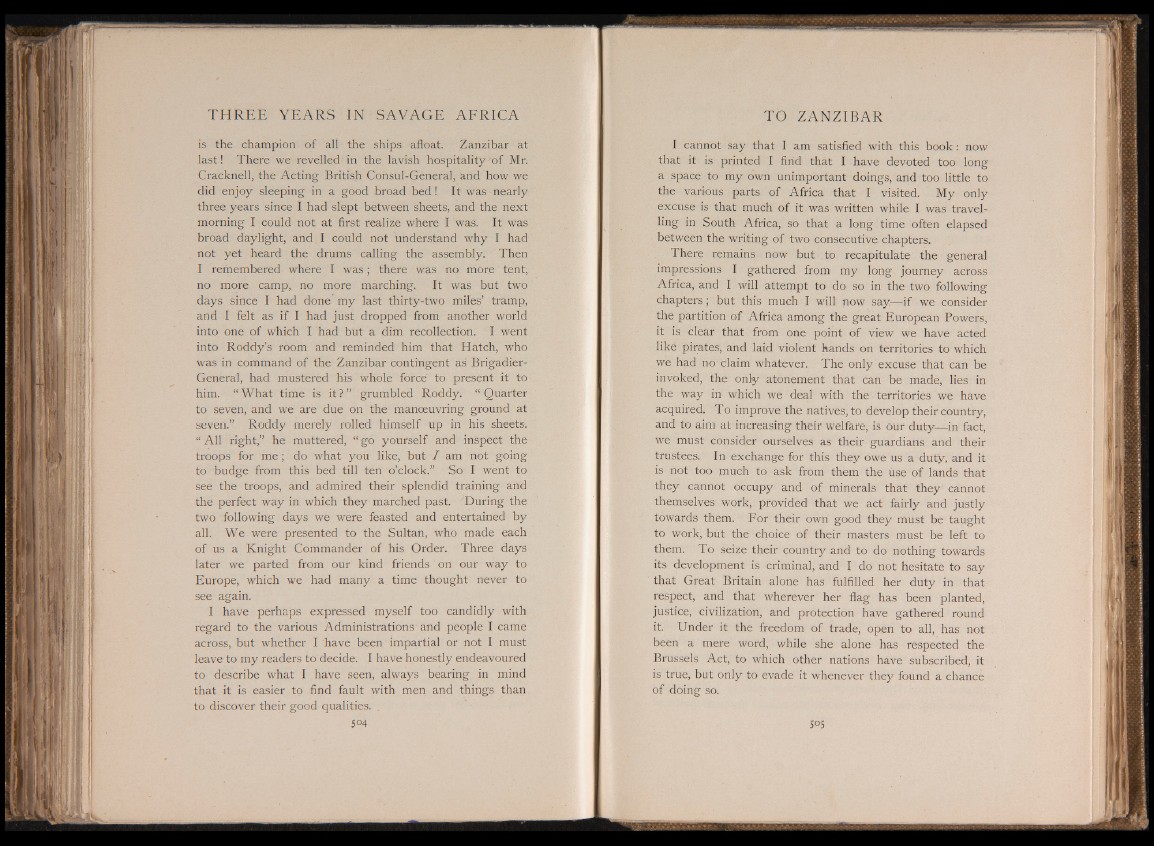
is the champion of all the ships afloat. Zanzibar at
last! There we revelled in the lavish hospitality of Mr.
Cracknell, the Acting British Consul-General, and how we
did enjoy sleeping in a good broad bed! It was nearly
three years since I had slept between sheets, and the next
morning I could not at first realize where I was. It was
broad daylight, and, I could not understand why I had
not yet heard the drums calling the assembly. Then
I remembered where I was; there was no more tent,
no more camp, no more marching. It was but two
days since I had done my last thirty-two miles’ tramp,
and I felt as if I had just dropped from another world
into one of which I had but a dim recollection. I went
into Roddy’s room and reminded him that Hatch, who
was in command of the Zanzibar contingent as Brigadier-
General, had mustered his whole force" to present it to
him. “ What time is it ? ” grumbled Roddy. “ Quarter
to seven, and we are due on the manoeuvring ground at
seven.” Roddy merely rolled himself up in his sheets;
“ All right,” he muttered, “ go yourself and inspect the
troops for me; do what you like, but / am not going
to budge from this bed till ten o’clock.” So I went to
see the troops, and admired their splendid training and
the perfect way in which they marched past. 'During the
two following days we were feasted and entertained by
all. We were presented to the Sultan, who made each
of us a Knight Commander of his Order. Three days
later we parted from our kind friends on our way to
Europe, which we had many a time thought never to
see again.
I have perhaps expressed myself too candidly with
regard to the various Administrations and people I came
across, but whether I have been impartial or not I must
leave to my readers to decide. I have honestly endeavoured
to describe what I have seen, always bearing in mind
that it is easier to find fault with men and things than
to discover their good qualities.
504
I cannot say that I am satisfied with this book: now
that it is printed I find that I have devoted too long
a space to my own unimportant doings, and too little to
the various parts of Africa that I visited. My only
excuse is that much of it was written while I was travelling
in South Africa, so that a long time often elapsed
between the writing of two consecutive chapters.
There remains now but to recapitulate the general
impressions I gathered from my long journey across
Africa, and I will attempt to do so in the two following
chapters; but this much I will now sayg-if we consider
the partition of Africa among the great European Powers,
it is clear that from one point of view we have acted
like pirates, and laid violent hands on territories to which
we had no claim whatever. The only excuse that can be
invoked, the only atonement that can be made, lies in
the way in which we deal with the territories we have
acquired. To improve the natives, to develop their country,
and to aim at increasing their welfare, is our duty—in fact,
we must consider ourselves as their guardians and their
trustees. In exchange for this they owe us a duty, and it
is not too much to ask from them the use of lands that
they cannot occupy and of minerals that they cannot
themselves work, provided that we act fairly and justly
towards them. For their own good they must be taught
to work, but the choice of their masters must be left to
them. To seize their country and to do nothing towards
its development is criminal, and I do not hesitate to say
that Great Britain alone has fulfilled her duty in that
respect, and that wherever her flag has been planted,
justice, civilization, and protection have gathered round
it. Under it the freedom of trade, open to all, has not
been a mere word, while she alone has respected the
Brussels Act, to which other nations have subscribed, it
is true, but only to evade it whenever they found a chance
of doing so.